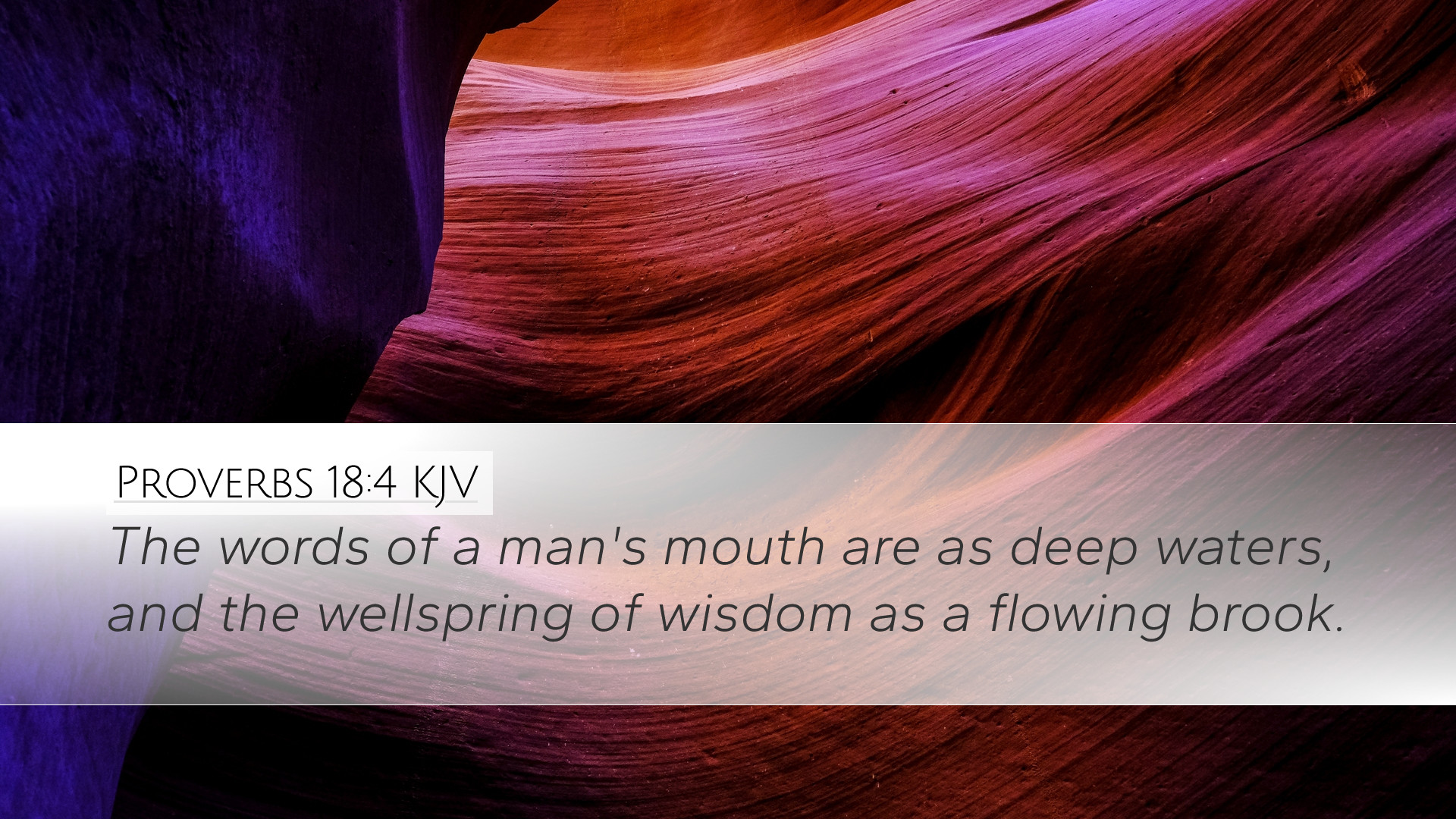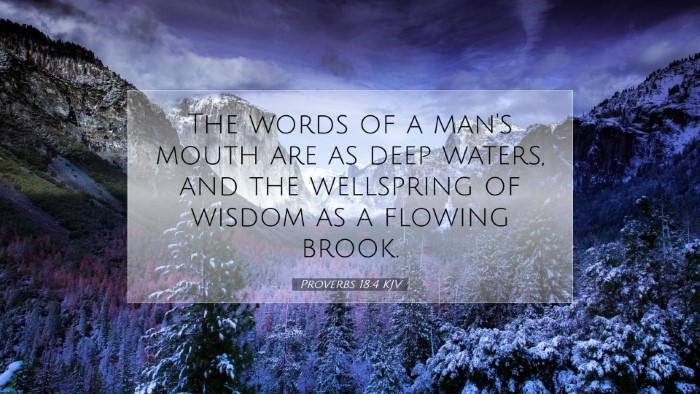Commentary on Proverbs 18:4
Verse: "The words of a man's mouth are as deep waters, and the wellspring of wisdom as a flowing brook." (Proverbs 18:4)
Introduction
This verse from Proverbs captures the essence of speech and wisdom, indicating the profundity and richness that words can convey. It compares a person's words to deep waters, suggesting that there is great depth and complexity in what is spoken. This commentary seeks to explore the insights offered by notable public domain commentaries including those by Matthew Henry, Albert Barnes, and Adam Clarke.
Analysis of the Verse
Proverbs 18:4 emphasizes two key aspects of communication: the nature of verbal expression and the source of wisdom. The dual metaphors of “deep waters” and “flowing brook” invite reflection on both the intrinsic qualities of speech and the contemplative richness that wisdom provides.
Deep Waters
Matthew Henry interprets the phrase "deep waters" as a metaphor for thoughtful and profound speech. Just as deep waters can seem tranquil on the surface while concealing great depth beneath, so too can the words of a man possess layers of meaning and complexity. Words, therefore, are not merely superficial expressions; they have the potential to convey deep insights and reflections.
- Reservoir of Wisdom: Words may act as a reservoir of wisdom, where thoughtful intent and knowledge can be shared.
- Careful Communication: Henry highlights the importance of carefully considering one’s words, as they can have significant implications that reach beyond immediate circumstances.
Wellspring of Wisdom
Albert Barnes adds another layer to this understanding by defining "the wellspring of wisdom" as a source from which wisdom flows freely. This imagery of a flowing brook suggests that wisdom is not static; it is dynamic and vibrant. The flowing nature of wisdom indicates that it can continuously nourish thoughts and actions, much like a brook provides freshwater.
- Access to Wisdom: Barnes explains that the wise person draws from this wellspring, sharing insights that benefit others.
- Life-Giving Quality: Just as a flowing brook can be life-giving, wise words can edify and enrich relationships and communities.
Contrast in Speech
Adam Clarke notes the contrast present in this proverb. He emphasizes that not all words carry the same weight; while some may be merely superficial, others hold profound significance. Clarke suggests that discernment is required to recognize which words serve as deep waters leading to wisdom and which may merely constitute empty chatter.
- Judgment and Discretion: It is essential for individuals, especially leaders and educators, to discern the nature of their own words and the words of others.
- Impact of Words: Clarke points to the reality that words can influence lives for better or worse, which reinforces the need for wisdom in speech.
Application in Ministry and Life
For ministers, theologians, students, and scholars, this verse offers profound applications in both personal and communal contexts. The insights provided by the commentaries illuminate the significance of wisdom in speech and encourage deeper reflection on how to communicate effectively.
1. The Power of Words
Recognizing the intrinsic power of words is the first step toward wise communication. Proverbs teaches that the tongue holds the power of life and death (Proverbs 18:21). Thus, individuals are urged to weigh their words carefully and aim to communicate messages that build others up rather than tearing them down.
2. Cultivating Wisdom
Believers are called to cultivate wisdom in their personal lives. By actively seeking wisdom through prayer, study, and experience, they can ensure that their words reflect the “wellspring of wisdom” that should flow freely from their hearts.
3. Teaching and Training
In a teaching or pastoral context, this verse serves as a reminder of the responsibility held by leaders to communicate deeply and meaningfully. Inspiring messages that reflect profound truth and wisdom can have lasting impacts on congregations and communities.
4. Listening and Discernment
Finally, the call to listen thoughtfully and discernatively is crucial. In a world often filled with noise, discerning which voices convey true wisdom is vital. Engaging with others in dialogue and seeking to understand their words can lead to enriching relationships and insights.
Conclusion
Proverbs 18:4 serves as a timeless reminder of the depth and potential of our words. Drawing from the insightful commentaries of Henry, Barnes, and Clarke, we are encouraged to aspire towards wisdom in our communication. By recognizing our words as deep waters and our insights as a flowing brook, we can strive to be conduits of wisdom that bless, enrich, and guide those around us.


